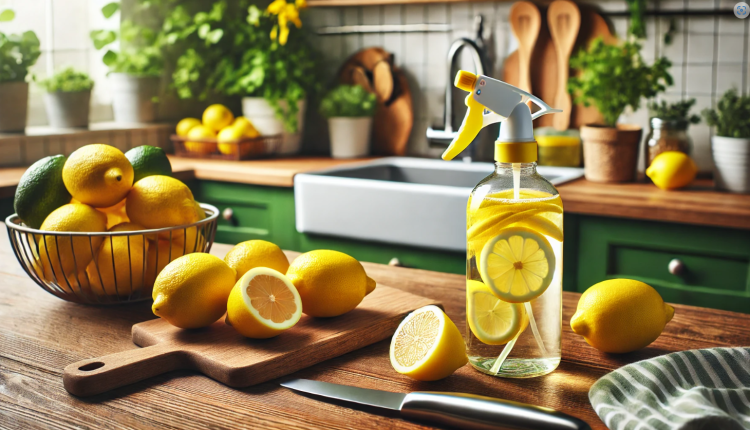Harnessing the Power of Lemons for Eco-Friendly Cleaning
In an era where environmental consciousness is paramount, many are turning to natural alternatives for household cleaning. Lemons, with their potent citric acid and refreshing aroma, have emerged as a versatile and eco-friendly cleaning agent. This article delves into the myriad ways lemons can be utilized to maintain a spotless home while minimizing chemical use.
The Science Behind Lemon’s Cleaning Power
Lemons are rich in citric acid, a natural compound effective at breaking down grease, grime, and mineral deposits. Their inherent antibacterial and antiseptic properties make them suitable for disinfecting surfaces, while the fresh scent serves as a natural deodorizer, leaving spaces smelling clean and invigorated.
Applications of Lemon in Green Cleaning
1. All-Purpose Cleaner
Create a simple yet effective all-purpose cleaner by combining lemon juice with water. Mix the juice of one lemon with two cups of warm water in a spray bottle. This solution can be used to clean countertops, sinks, and other surfaces, effectively cutting through grease and eliminating bacteria. For enhanced cleaning power, consider adding a half cup of white vinegar to the mixture.
2. Natural Bleaching Agent
Lemon juice’s natural bleaching properties make it ideal for whitening fabrics and removing stains. Apply lemon juice directly to stains on clothing, let it sit for 30 minutes, and then wash as usual. This method is particularly effective for treating underarm stains on white shirts.
3. Microwave Cleaner
Harness the steam-cleaning power of lemons to tackle microwave grime. Place a bowl of water with lemon slices or a few tablespoons of lemon juice inside the microwave and heat until it boils. The steam will loosen food particles and stains, making them easy to wipe away while leaving a pleasant citrus scent.
4. Glass and Mirror Cleaner
Achieve streak-free shine on glass surfaces by mixing four tablespoons of lemon juice with one cup of water in a spray bottle. Spray the solution onto windows or mirrors and wipe with a lint-free cloth for a sparkling finish.
5. Cutting Board Sanitizer
Lemons can effectively sanitize cutting boards, especially those made of wood. Sprinkle coarse salt over the board’s surface, then scrub with half a lemon, squeezing gently to release the juice. This combination removes stains, neutralizes odors, and disinfects the board. Rinse with warm water and allow to dry.
6. Garbage Disposal Freshener
Maintain a fresh-smelling garbage disposal by using lemon peels. Regularly grinding lemon peels in the disposal cleans the blades and imparts a pleasant citrus aroma, combating unpleasant odors.
7. Rust Remover
The acidity of lemon juice makes it effective at dissolving rust on metal surfaces. Create a paste using lemon juice and salt, apply it to the rusted area, let it sit for a few hours, then scrub off the rust with a brush. This method is suitable for rust stains on knives, utensils, and other metal objects.
8. Furniture Polish
Combine two parts olive oil with one part lemon juice to create a natural furniture polish. Apply a small amount to a soft cloth and rub onto wooden furniture to restore shine and nourish the wood, all while avoiding the chemicals found in commercial polishes.
9. Drain Deodorizer
Over time, drains can emit unpleasant odors. Pouring a mixture of lemon juice and baking soda down the drain can neutralize these smells. The effervescent reaction helps dislodge debris, while the lemon leaves a fresh scent.
10. Tile and Grout Cleaner
Lemon juice can help dissolve soap scum and hard water deposits on bathroom tiles and grout. Apply lemon juice directly to the affected areas, let it sit for a few minutes, then scrub with a brush to remove buildup and brighten grout lines.
Advantages of Using Lemons in Cleaning
- Eco-Friendly: Lemons are biodegradable and free from the harsh chemicals present in many commercial cleaners, reducing environmental impact.
- Cost-Effective: Utilizing lemons, a common household item, can be more economical than purchasing specialized cleaning products.
- Health Benefits: Reducing exposure to chemical cleaners can decrease the risk of respiratory issues and skin irritations, promoting a healthier home environment.
Considerations When Cleaning with Lemons
While lemons are a powerful natural cleaner, it’s important to note that their acidity can potentially damage certain surfaces. Avoid using lemon-based solutions on natural stone surfaces like marble or granite, as the acid can etch the stone. Additionally, always rinse surfaces after cleaning with lemon to prevent any sticky residue.
Conclusion
Incorporating lemons into your cleaning routine offers a natural, effective, and environmentally friendly alternative to chemical-laden products. Their versatility and cleaning prowess make them an invaluable asset in maintaining a clean and healthy home. By harnessing the power of lemons, you contribute to a greener planet while ensuring your living spaces are spotless and fresh.

